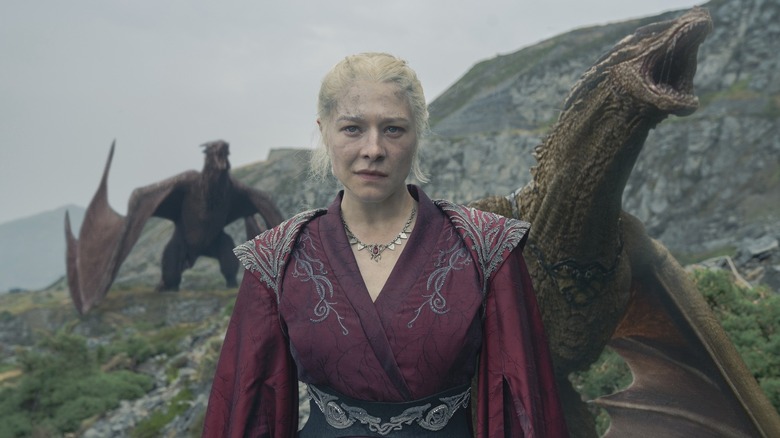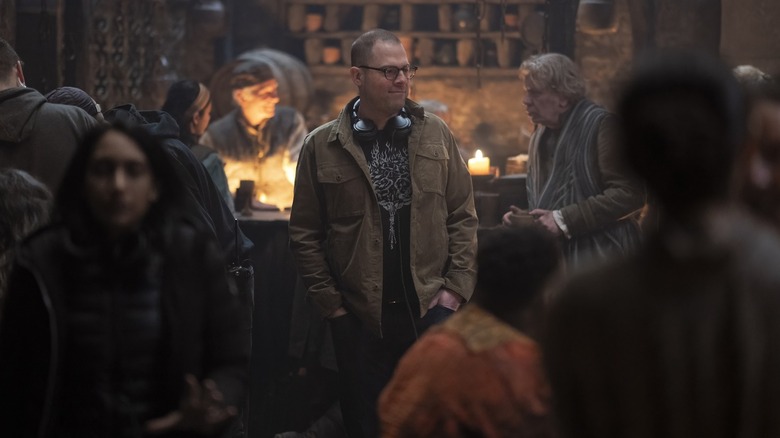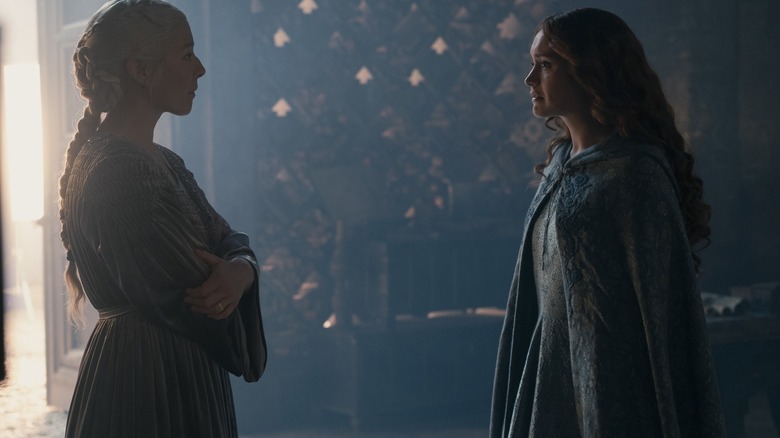House Of The Dragon Creator Breaks Silence On George R.R. Martin's Criticisms
You know, when "House of the Dragon" was originally pitched to HBO as a civil war pitting two powerful individuals against one another in a battle for control with everything at stake, I don't think this is quite what they had in mind. The saga unfolding behind-the-scenes between "A Song of Ice and Fire" author George R.R. Martin and series showrunner Ryan Condal might just rival that of Queen Alicent Hightower (Olivia Cooke) and Princess Rhaenyra Targaryen (Emma D'Arcy). Now, we're finally hearing from the other side of the great debate.
For the first time, Condal is addressing the dragon-sized elephant in the room. As production is now officially underway on the third season of "House of the Dragon," the showrunner is finally responding to Martin's discontent over how the former approached certain storylines and subplots from season 2. Fans will undoubtedly remember the notorious "Blood and Cheese" episode, which featured one of the darkest moments in the entire story. While it certainly lived up to the hype, Martin indicated that he had some serious reservations about certain changes from the text of his fictional historical novel "Fire & Blood." The opinionated writer promised to address those concerns in a blog post down the line, which he ultimately did ... and promptly set the internet ablaze. In the now-deleted post, Martin pulled no punches in describing his main gripes with Condal (whom Martin personally brought on board to lead the show in the first place, mind you) over key characters omitted from the adaptation and the larger side effects this would cause in later seasons.
In an extensive Zoom interview with Entertainment Weekly, Condal admits that the public spat with his own "hero" was quite difficult to stomach: "It was disappointing. I will simply say I've been a fan of 'A Song of Ice and Fire' for almost 25 years now, and working on the show has been truly one of the great privileges of, not only my career as a writer, but my life as a fan of science-fiction and fantasy. George himself is a monument, a literary icon in addition to a personal hero of mine, and was heavily influential on me coming up as a writer."
According to Ryan Condal, George R.R. Martin was 'unwilling to acknowledge the practical issues'
Could there be a more perfect story for the internet age? At its heart, the "House of the Dragon" drama is a classic example of the original author having significant misgivings about adaptation choices made to the source material. While diehard fans may be inclined to instantly side with their favorite fantasy writer, the truth is likely somewhere closer to the middle. The slow-motion car crash takes on even more of a tragic air when you remember how Ryan Condal ended up in the driver's seat for "House of the Dragon" in the first place. A huge fan of George R.R. Martin's books, Condal set up a meeting with his idol and ultimately earned his blessing to adapt the story for HBO. Now, sadly, it appears the two are hardly even on speaking terms anymore. Condal went on to tell Entertainment Weekly about the root of the issue between the two headstrong creatives:
"I will simply say, I made every effort to include George in the adaptation process. I really did. Over years and years. And we really enjoyed a mutually fruitful, I thought, really strong collaboration for a long time. But at some point, as we got deeper down the road, he just became unwilling to acknowledge the practical issues at hand in a reasonable way. And I think as a showrunner, I have to keep my practical producer hat on and my creative writer, lover-of-the-material hat on at the same time. At the end of the day, I just have to keep marching not only the writing process forward, but also the practical parts of the process forward for the sake of the crew, the cast, and for HBO, because that's my job. So I can only hope that George and I can rediscover that harmony someday. But that's what I have to say about it."
This would hardly be the first time a writer ended up having issues with adaptations of their own work, but the context surrounding this certainly makes this feel worthy of a real-life soap opera. Despite the popular consensus surrounding the lackluster ending of Martin's previous series "Game of Thrones," he never once spoke out as harshly (or as publicly) against showrunners David Benioff and D.B. Weiss. "House of the Dragon," however, was a different story altogether.
For better or worse, this was the Fire & Blood adaptation Ryan Condal always wanted to see
Leave it to George R.R. Martin to find the absolute nerdiest complaint about "House of the Dragon." Most audiences were flabbergasted by the decision to end the second season on an unresolved note that didn't pay off the major battle sequence that the entire arc had been leading up to — a move that, in all fairness, was dictated by the duel writer's and actor's strikes interfering with production. Martin, meanwhile, pinned most of his worries on the relatively minor child character of Prince Maelor (the son of Tom Glynn-Carney's King Aegon and Phia Saban's Queen Helaena) who, in his story, grows up to play a fairly crucial role in the future. Martin has talked many times about the "butterfly effect," explaining that seemingly small choices in the screenwriting process early on can suddenly grow into monstrous problems later on.
So how could Ryan Condal make such a blunder? Well, he emphasizes how everything that fans end up seeing on their television screens was done carefully, purposefully, and with plenty of thought behind it. To his credit, the showrunner owns the changes he made from the original "Fire & Blood" story and insists that they were done for a reason ... even if we can't quite see that just yet. As he put it very diplomatically:
"There's nothing we do on the show without talking it through and thinking about it very deeply for usually many months, if not years. I will just say that the creative decisions that we make in the show all flow through me, every single one of them, and this is the show that I want to make and believe, as a fan of 'Fire & Blood' and a deep reader of this material, it is the adaptation that we should be making to not only serve 'Fire & Blood,' but also a massive television audience."
That may not be enough to heal the rift between himself and Martin, nor to quell the concerns of a somewhat agitated fanbase (just head on over to the longsuffering fans over at the "A Song of Ice and Fire" subreddit to see for yourself), but that's as honest and straightforward an answer as we could hope for from the main voice behind "House of the Dragon."


